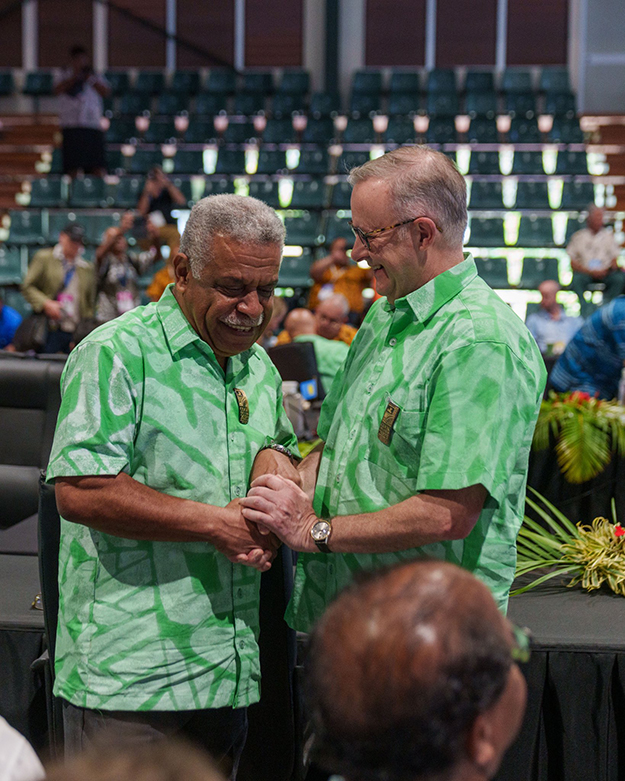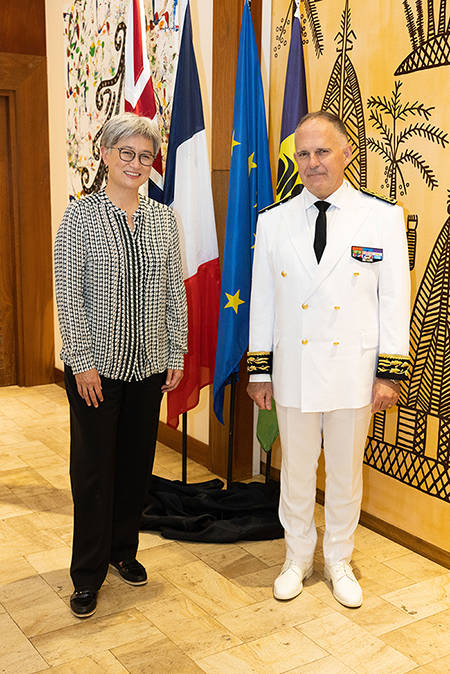Overview
New Caledonia is a semi-autonomous French territory. Under the Noumea Accord signed in 1998, the French State retains sovereignty for defence, foreign affairs, law and order, monetary policy, and tertiary education and research.
New Caledonia comprises the main island of Grande Terre (where the capital, Nouméa, is situated), the four Loyalty Islands (Ouvéa, Lifou, Tiga and Maré), the Belep archipelago, the Isle of Pines and some remote islands.
Just over 270,000 people live in New Caledonia (2019 census). Approximately 39 per cent are indigenous ('Kanak'). The remainder are Caledonians of European, Polynesian and other (including Vietnamese, Indonesian and Algerian) origins.
Political overview
As a French overseas territory, the President of the French Republic is New Caledonia's Head of State and is represented in New Caledonia by a High Commissioner.
New Caledonia is one of the European Union's Overseas Countries and Territories (OCTs), but is not part of the European Union, the Euro or Schengen zones.
The Nouméa Accord (1998) and consequent Organic Law (March 1999) provide the constitutional framework under which New Caledonia is governed. The Accord also defines New Caledonia's relations with France and sets out a timetable for New Caledonia to assume responsibility for most areas of government.
The New Caledonian Congress was mandated to request up to three referendums on whether New Caledonia should assume the final sovereign powers and become fully independent from France. After the two previous referendums produced results against independence, a third and final referendum was held on 12 December 2021 with the majority of votes cast on the day being in favour of remaining a part of France. On 13 December 2021, New Caledonia entered a transitional period in which new arrangements with France are to be developed. This process is underway.
Under the Nouméa Accord, there are three provincial assemblies (elected under a proportional representation process for five-year terms) — the Southern (40 members), Northern (22 members) and Loyalty Islands provinces (14 members). The most recent territorial election was held in New Caledonia on 12 May 2019. Fifty-four (from these 76) members of the Provincial Assemblies then become the New Caledonian Congress which, in turn, elects a collegiate, cross-party executive Government of New Caledonia of between five and 11 members (which do not necessarily need to be assembly members themselves), and is accountable to the Congress. The members of the Government of New Caledonia appoint a President to lead the executive. The New Caledonian Congress also appoints a President of the Congress (equivalent to a Speaker role).
The Nouméa Accord provides for an Economic and Social Council and a Customary Senate, comprising representatives from each of New Caledonia's eight customary areas, to advise the Government. Both the New Caledonian Government and the French State must consult the Customary Senate on subjects relating to Kanak identity.
France and New Caledonia remain in ongoing discussions regarding institutional future arrangements.
Economic overview
New Caledonia has a long-established nickel industry and around one-quarter of the world's known nickel deposits, making it one of the world's leading nickel exporters. However, high global nickel prices, operation costs, and recent unrest has challenged the nickel industry. New Caledonia also has a well-established tourism industry, that caters to high-end, eco-driven and cruise tourism. The Government of New Caledonia is encouraging ongoing diversification of potential exports and enhanced economic integration in the Pacific region.
Financial transfers from France are also an important source of revenue in New Caledonia. This covers expenditure on defence, domestic security, primary and secondary education and public services, as well as the salaries, social security contributions and pensions of State employees. It also includes direct grants to the Territorial and Provincial Governments, and additional funds go to targeted economic development projects.
New Caledonia has the third highest GDP per capita in the region (after Australia and New Zealand). There is a significant disparity in wealth distribution and a high cost of living.
Foreign relations
New Caledonia has close ties with its neighbours, particularly Vanuatu with whom it has had a cooperation agreement since 2002. Since 2019, New Caledonia has appointed official representatives to represent it in five Pacific countries including Australia, Fiji, New Zealand, Papua New Guinea and Vanuatu. These officials are embedded within these countries' respective French Embassies.
Australia, Indonesia, Japan, New Zealand and Vanuatu each have a diplomatic presence in New Caledonia.
As provided for in the Nouméa Accord, New Caledonia and France share responsibility for New Caledonia's regional relations, allowing New Caledonia to join some regional organisations in its own right. In 2016, New Caledonia was granted full membership of the Pacific Islands Forum (PIF), alongside French Polynesia. New Caledonia is a long-standing member of the Pacific Community (SPC), which has its secretariat headquartered in Nouméa.
New Caledonia is a member of the South Pacific Regional Environment Program (SPREP) and the South Pacific Tourism Organisation (SPTO). New Caledonia is also an associate member of the International Organisation of La Francophonie and has a non-voting seat on the World Health Organization Western Pacific Regional Committee.
The Kanak and Socialist National Liberation Front (FLNKS) coalition of pro-independence parties is a member of the Melanesian Spearhead Group (MSG).
Bilateral relations
Australia is represented in New Caledonia by a Consul-General based in Nouméa.
Relations between Australia and New Caledonia are broad and historic, extending across a range of domains. In 2025, Australia celebrated its 85th anniversary of Australian diplomatic representation in New Caledonia. Nouméa was Australia's first overseas diplomatic mission in the Pacific, and fourth globally, after only London, Washington and Ottawa.
Australia and New Caledonia share much in common, foremost our interest in stability in the Pacific region. As close neighbours, we worked closely together during the COVID-19 pandemic response, including on repatriations, medical evacuations and the regional health response. We also coordinate closely on our responses to natural disasters in the region.
Australia works with the New Caledonian and French authorities in New Caledonia in a range of areas including promoting greater trade and investment; cooperating on regional and natural disaster relief; defence cooperation including combatting illegal, unreported and unregulated fishing and joint exercises; combatting security threats and transnational crime; and tackling gender-based violence across the Pacific.
In late 2020, defence ties were strengthened further with the establishment of a new Australian Defence Force Liaison Officer to the French Armed Forces in New Caledonia (FANC).
In April-May 2025, the FANC hosted multilateral humanitarian assistance and disaster response exercise Croix du Sud in Wallis and Futuna. This brought together over 3,000 participants from over 19 nations, including over 240 Australian Defence Force (ADF) and Department of Foreign Affairs and Trade (DFAT) personnel.
Foreign Minister Wong visited Nouméa on 19-20 April 2023 and became the first foreign politician to address the Congress of New Caledonia.
People-to-people links
Australians and New Caledonians have forged longstanding and enduring people-to-people links across business, education, arts, sport, defence, police cooperation and healthcare.
Tourism links are strong with the number of Australians visiting New Caledonia reaching pre-pandemic levels. Australia is also the primary holiday destination for New Caledonians, particularly the Gold Coast, which has a sister city relationship with Nouméa.
The Pacific Australia Labour Mobility (PALM) scheme is expanding to include New Caledonia. New Caledonia’s participation will be a gradual and staged approach with an initial pilot seeing the recruitment and deployment of up to 100 PALM scheme workers over a two-year period. Australia is working closely with French and New Caledonian officials to discuss the design and implementation of New Caledonia’s participation in the scheme.
Australians and New Caledonians have longstanding and enduring links in the education sector. Australia's New Colombo Plan has included New Caledonia as a destination for Australian students since 2018, enabling dozens of Australian students to learn about New Caledonia, its regional integration, culture and languages.
In June 2020, France and Australia exchanged letters, formally endorsing the introduction of an Australian studies section in the French Baccalaureate International Option (OIB), which had been piloted in New Caledonian schools since 2017.
As part of the Australia-France Roadmap's Pacific Shared Knowledge Initiative, Australia has opened its Australia Awards scholarships program to New Caledonians and French Polynesians – enabling students from the French territories to pursue postgraduate studies in Australia each year. Six students from New Caledonia commenced studies in 2025.
Australia and New Caledonia-based universities and research bodies have strong ties in a number of fields including mining, agriculture, marine science and tropical health.
Australia and New Caledonia also have strong cultural exchanges. In November 2019, Indigenous Australian rapper and dancer, as well as then Young Australian of the Year, Baker Boy, conducted a series of culturally and linguistically diverse musical workshops with children across New Caledonia in celebration of the International Year of Indigenous Languages.
Indigenous rangers from Arnhem Land visited New Caledonia in February and May 2023, focusing their engagement on land management, indigenous tourism and cultural exchange.
Walmatjarri Elder Kankawa Nagarra visited New Caledonia in March 2024, to perform and connect with local artists – including musicians, painters and illustrators.
In March 2025, Jeffrey Simon from Tiwi Islands' B2M and Manuel Dhurrkay from the Northern Territory's Saltwater travelled to New Caledonia for a week of cultural and musical exchange.
Australians and New Caledonians also share a strong passion for sports, especially rugby and football. In the lead up to the 2019 Rugby World Cup, the Wallabies held their final training camp in New Caledonia.
Trade and investment
Australian exports to New Caledonia include coal, tourism and education services, and civil engineering equipment and parts. New Caledonia's exports to Australia include tourism, business- and education-related travel, and non-ferrous waste and scrap. Australia is also a significant investment destination for New Caledonia.
Information on trade and investment with New Caledonia
High-level visits and meetings
- November 2025: Visit by Brigadier General Gabriel Soubrier Commander of the French Armed Forces in New Caledonia to Canberra
- February-March 2024: Canberra Fellowships Program visit by Christopher Gygès, Minister-equivalent for the Economy of the Government of New Caledonia, Pascal Sawa, President of the Congress' External Relations Committee, Mayor of Houaïlou, Congress of New Caledonia, Northern Province Assembly, and Omayra Naisseline, Third Vice President for Integrated Economy, Loyalty Islands Province, Congress of New Caledonia, Loyalty Islands Province Assembly.
- December 2023: Visit by Deputy Prime Minister and Minister for Defence, the Hon Richard Marles MP, and General Angus Campbell, Chief of the Australian Defence Force, to New Caledonia for the 2023 South Pacific Defence Ministers' Meeting.
- September 2023: Visit by Major General Yann Latil Commander of the French Armed Forces in New Caledonia to Canberra
- April 2023: Visit by Foreign Minister Senator the Hon Penny Wong, to New Caledonia.
- January 2023: Visit by General Angus Campbell, Chief of the Australian Defence Force, to New Caledonia
- August 2022: Visit by Brigadier General Valéry Putz Commander of the French Armed Forces in New Caledonia to Canberra.
- March 2020: Visit by Christopher Gygès, Minister-equivalent for the Economy of the Government of New Caledonia, to Brisbane and Canberra, including meeting with then Minister Assisting the Minister for Trade and Investment, the Hon Andrew Gee MP.
- March 2020: Visit by Jacques Lalié, President of the Loyalty Islands Province of New Caledonia, to Brisbane.
- January 2020: Visit by General Angus Campbell, Chief of the Australian Defence Force, to New Caledonia.
- December 2019: Visit by Sonia Backès, President of the South Province of New Caledonia, to Sydney.
- July 2019: Visit by Senator the Hon Marise Payne, then Minister for Foreign Affairs and Minister for Women to New Caledonia.
- May 2018: Visit by Senator the Hon Marise Payne, then Minister for Defence, to New Caledonia.
- May 2018: Visit by Senator the Hon Concetta Fierravanti-Wells, then Minister for International Development and the Pacific, to New Caledonia.
- July 2017: Visit by Senator the Hon Concetta Fierravanti-Wells, then Minister for International Development and the Pacific to New Caledonia.
- October 2016: Visit to Australia by Philippe Germain, President of the Government of New Caledonia.




